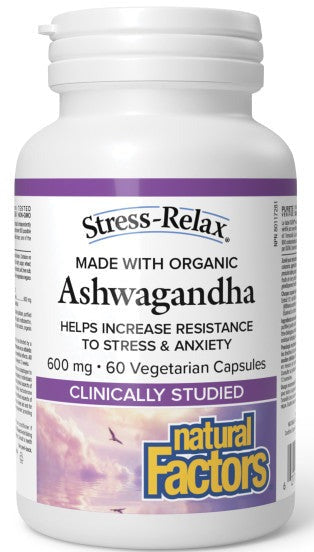Ashwagandha KSM-66 - Stress & Anxiety
Ashwagandha KSM-66 - Stress & Anxiety
Helps increase resistance to stress and anxiety
Uses & Benefits
- Helps increase resistance to stress in individuals with a history of chronic stress
- Traditionally used in Ayurvedic medicine as a sleep aid and nerve tonic, and for memory enhancement
- Helps improve physical performance when combined with regular resistance training
- Traditionally used in Ayurvedic medicine to relieve general debility, especially during convalescence or old age
- Provides athletic support as a workout supplement
- Helps promote healthy testosterone production in men
Stress-Relax Ashwagandha contains organic KSM-66 Ashwagandha™ root extract. This clinically studied herbal supplement helps increase resistance to stress and anxiety in individuals with a history of chronic stress, thereby improving their quality of life. Ashwagandha is a well-recognized Ayurvedic herb that has been shown to have many health benefits related to physical and mental stress. It is traditionally used in Ayurvedic medicine to balance aggravated Vata (as a nerve tonic), as a sleep aid, for memory enhancement, and to relieve general debility, especially during convalescence or old age. KSM-66 Ashwagandha can also be used as a workout supplement to provide athletic support, helping to improve physical performance in previously untrained individuals when combined with regular resistance training.
KSM-66 Ashwagandha is a full-spectrum extract made from only the ashwagandha root. It is one of the most clinically studied ashwagandha root extracts on the market and has the same potency used in multiple clinical studies. Just one capsule provides a 600 mg dose equivalent to 7200 mg of dried ashwagandha, standardized to 5% of withanolides. This is a great choice for people who are feeling overwhelmed by stress and anxiety, and anyone looking for a herbal exercise supplement.
Medicinal ingredients
Each vegetarian capsule contain: Organic KSM-66 Ashwagandha™ extract 12:1 (Withania somnifera) (root) (5% withanolides) 600mg (Equivalent to 7200 mg total dried ashwagandha)
Non-medicinal ingredients: Vegetarian capsule (pullulan, purified water), organic Oryza sativa (rice) hull powder, organic maltodextrin, organic Oryza sativa (rice) bran extract, organic gum arabic, organic sunflower oil.
Contains no artificial colours, preservatives, or sweeteners; no dairy, sugar, wheat, gluten, yeast, soy, corn, egg, fish, shellfish, animal products, salt, tree nuts, or GMOs. Suitable for vegetarians/vegans.
Recommended dose
Recommended adult dose: 1 capsule daily or as directed by a health care practitioner.
For physical performances or as athletic support: Use for a minimum of 8 weeks to see beneficial effects.
All uses: Consult a health care practioner for use beyond 12 weeks.
How it works
Mental, physical, chemical, and other forms of stress trigger the body’s hypothalamus-pituitary-adrenal axis. The adrenal glands respond by releasing the stress hormones epinephrine, norepinephrine, and cortisol (Salve et al., 2019). Long-term or chronic exposure to elevated cortisol levels has a negative impact on health.
KSM-66 is a full-spectrum extract that contains the entire scope of phytonutrients present in ashwagandha root, including its main active group of steroidal alkaloids and lactones known as withanolides. Ashwagandha’s adaptogenic effects work through the hypothalamus-pituitary-adrenal axis, helping to regulate the release of cortisol into the blood stream (Auddy et al., 2008). Its cortisol-lowering effect is important for helping to achieve a normal sleep-wake cycle and regulating blood glucose levels (Salve et al., 2019; Auddy et al., 2008).
Ashwagandha’s anti-anxiety activity may be due to binding GABA (gamma-aminobutyric acid) receptors in the brain and calming nerve cell activity (Singh et al., 2011). Other typical physiological responses to stress, such as increased blood urea nitrogen, lactic acid, and corticosterone, along with the activation of dopamine receptors, are also reduced with ashwagandha (Wankhede et al., 2015).
As an exercise supplement, ashwagandha helps increase aerobic and cardiovascular endurance (Choudhary et al., 2015). It improves endurance by influencing the activity of ATPase, the enzyme responsible for breaking down ATP (Choudhary et al., 2015). It also reduces post-exercise levels of serum creatine kinase, resulting in less muscle damage and faster recovery (Handler, 2017).
Research
Long-term stress and anxiety can affect physical and mental wellbeing, negatively impacting memory, sleep, mood, energy levels, and immune function (Salve et al., 2019). Ashwagandha (Withania somnifera)is a plant in the nightshade family. This well-recognized Ayurvedic herb has many health benefits related to stress and anxiety. It is referred to as an adaptogen because it contains phytonutrients that increase the body’s resistance to mental, physical, and chemical stress (Wankhede et al., 2015).
In a double-blind, placebo-controlled study, stressed adults were supplemented with 300 mg of KSM-66 ashwagandha extract per day for 60 days. Based on a depression-anxiety stress scale (DASS), participants who took KSM-66 were found to have a 77% reduction in ratings of sadness, a 76% reduction in anxiety, and a 64% reduction in stress. In contrast, those taking the placebo had 5%, 4%, and 10% reductions, respectively. Blood samples also revealed that supplementation helped reduce cortisol levels by 28%, compared to only 8% in the placebo group (Chandrasekhar et al., 2012).
A double-blind, placebo-controlled study compared a placebo and two strengths of KSM-66 ashwagandha extract – 250 mg and 600 mg – taken by healthy stressed adults in two divided doses per day. Relative to baseline measurements, the 250 mg and 600 mg doses resulted in 34% and 38% reductions in perceived stress respectively, and 17% and 33% reductions in blood cortisol levels respectively over the eight weeks of supplementation. The 600 mg dose was also associated with a 16% reduction in Hamilton Anxiety Rating Scale (HAM-A) scores, while results from the lower dose were not statistically significant (Salve et al., 2019).
In Ayurvedic medicine, ashwagandha is a recognized rejuvenation tonic and sleep aid (Langade et al., 2019). Using a seven-point sleep scale, researchers found that participants who took 250 mg and 600 mg doses of ashwagandha per day improved significantly in measures of sleep quality (35% and 46% respectively) (Salve et al., 2019). Additionally, a randomized, double-blind, placebo-controlled study found that 300 mg of KSM-66 ashwagandha root extract, taken twice daily, significantly improved sleep habits in patients suffering from sleep deprivation and anxiety. Sleep actigraphy identified a 30% reduction in sleep onset latency (the time it takes to fall asleep) and a 10% improvement in patient sleep efficiency. A questionnaire also identified a 30% improvement in sleep quality compared to baseline measurements, while mental alertness upon waking up was found to improve gradually over the 10-week study (Langade et al., 2019).
High-intensity exercise physically stresses the body. KSM-66 ashwagandha can be used as a workout supplement to provide athletic support by increasing the body’s resistance to stress. This activity was assessed through a randomized, double-blind,
placebo-controlled study on men with little experience in resistance training. For eight weeks, men were supplemented with 300 mg of KSM-66 ashwagandha extract twice per day while taking part in resistance training. Compared to the placebo, men taking KSM-66 experienced a significant increase in upper and lower body muscle strength, significantly less exercise-induced muscle damage (as shown by blood creatine kinase tests), and a significant increase in testosterone levels (Wankhede et al., 2015).
Additionally, a double-blind, placebo-controlled study found that athletic men and women were able to improve their cardiorespiratory endurance through twice daily supplementation with 300 mg of KSM-66 ashwagandha. Results from 20 m shuttle run tests showed that the VO2 max (oxygen consumption during peak physical exertion) increased significantly (14%) over the 12 weeks of supplementation (Choudhary et al., 2015).
NATURAL FACTORS STRESS RELAX




